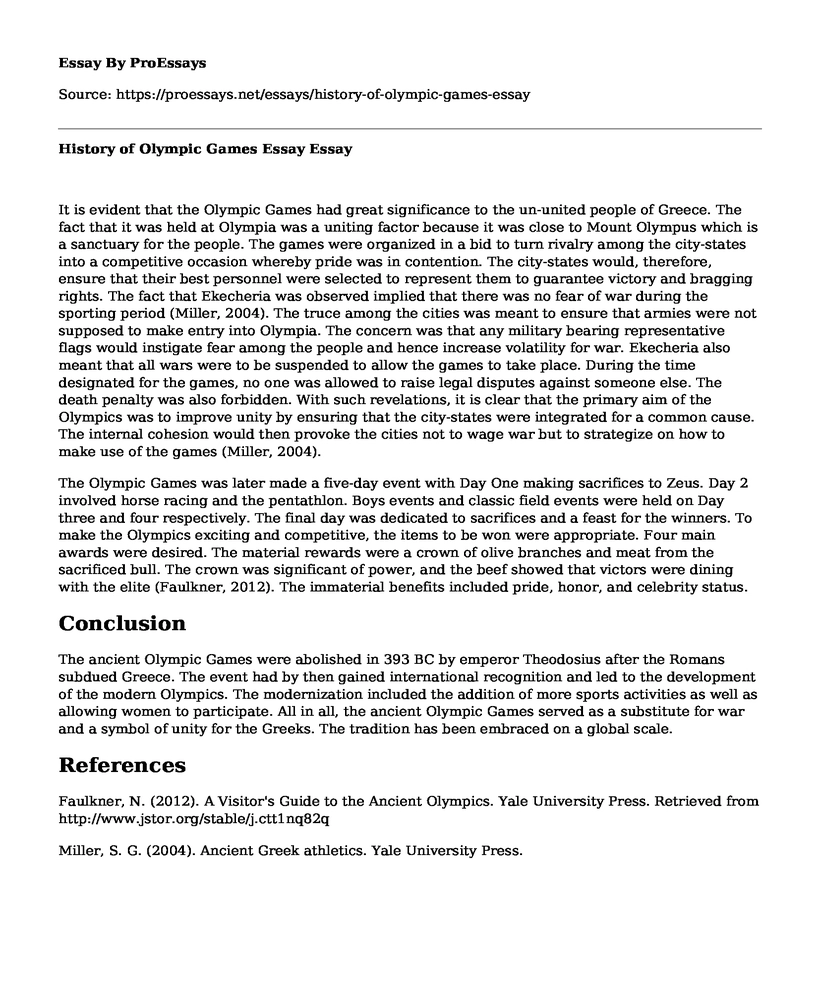It is evident that the Olympic Games had great significance to the un-united people of Greece. The fact that it was held at Olympia was a uniting factor because it was close to Mount Olympus which is a sanctuary for the people. The games were organized in a bid to turn rivalry among the city-states into a competitive occasion whereby pride was in contention. The city-states would, therefore, ensure that their best personnel were selected to represent them to guarantee victory and bragging rights. The fact that Ekecheria was observed implied that there was no fear of war during the sporting period (Miller, 2004). The truce among the cities was meant to ensure that armies were not supposed to make entry into Olympia. The concern was that any military bearing representative flags would instigate fear among the people and hence increase volatility for war. Ekecheria also meant that all wars were to be suspended to allow the games to take place. During the time designated for the games, no one was allowed to raise legal disputes against someone else. The death penalty was also forbidden. With such revelations, it is clear that the primary aim of the Olympics was to improve unity by ensuring that the city-states were integrated for a common cause. The internal cohesion would then provoke the cities not to wage war but to strategize on how to make use of the games (Miller, 2004).
The Olympic Games was later made a five-day event with Day One making sacrifices to Zeus. Day 2 involved horse racing and the pentathlon. Boys events and classic field events were held on Day three and four respectively. The final day was dedicated to sacrifices and a feast for the winners. To make the Olympics exciting and competitive, the items to be won were appropriate. Four main awards were desired. The material rewards were a crown of olive branches and meat from the sacrificed bull. The crown was significant of power, and the beef showed that victors were dining with the elite (Faulkner, 2012). The immaterial benefits included pride, honor, and celebrity status.
Conclusion
The ancient Olympic Games were abolished in 393 BC by emperor Theodosius after the Romans subdued Greece. The event had by then gained international recognition and led to the development of the modern Olympics. The modernization included the addition of more sports activities as well as allowing women to participate. All in all, the ancient Olympic Games served as a substitute for war and a symbol of unity for the Greeks. The tradition has been embraced on a global scale.
References
Faulkner, N. (2012). A Visitor's Guide to the Ancient Olympics. Yale University Press. Retrieved from http://www.jstor.org/stable/j.ctt1nq82q
Miller, S. G. (2004). Ancient Greek athletics. Yale University Press.
Cite this page
History of Olympic Games Essay. (2022, Jan 17). Retrieved from https://proessays.net/essays/history-of-olympic-games-essay
If you are the original author of this essay and no longer wish to have it published on the ProEssays website, please click below to request its removal:
- The Philosophy of Henry Thoreau - Paper Example
- The Paradigm of Gender, Sexuality and the Ancient Roman History - Essay Sample
- The Skill on How to Throw a Foot Ball and Theory in Motor Learning Paper Example
- From Jamestown to a Global Power: The US History Journey
- Essay Example on Gods of the Nine Planets Revere Elayi, Chief Goddess' Son
- Essay Example on Eleanor Roosevelt: Defining Leadership & Putting It Into Practice
- Article Analysis Essay on Slavery and Abolition in the 20th Century







